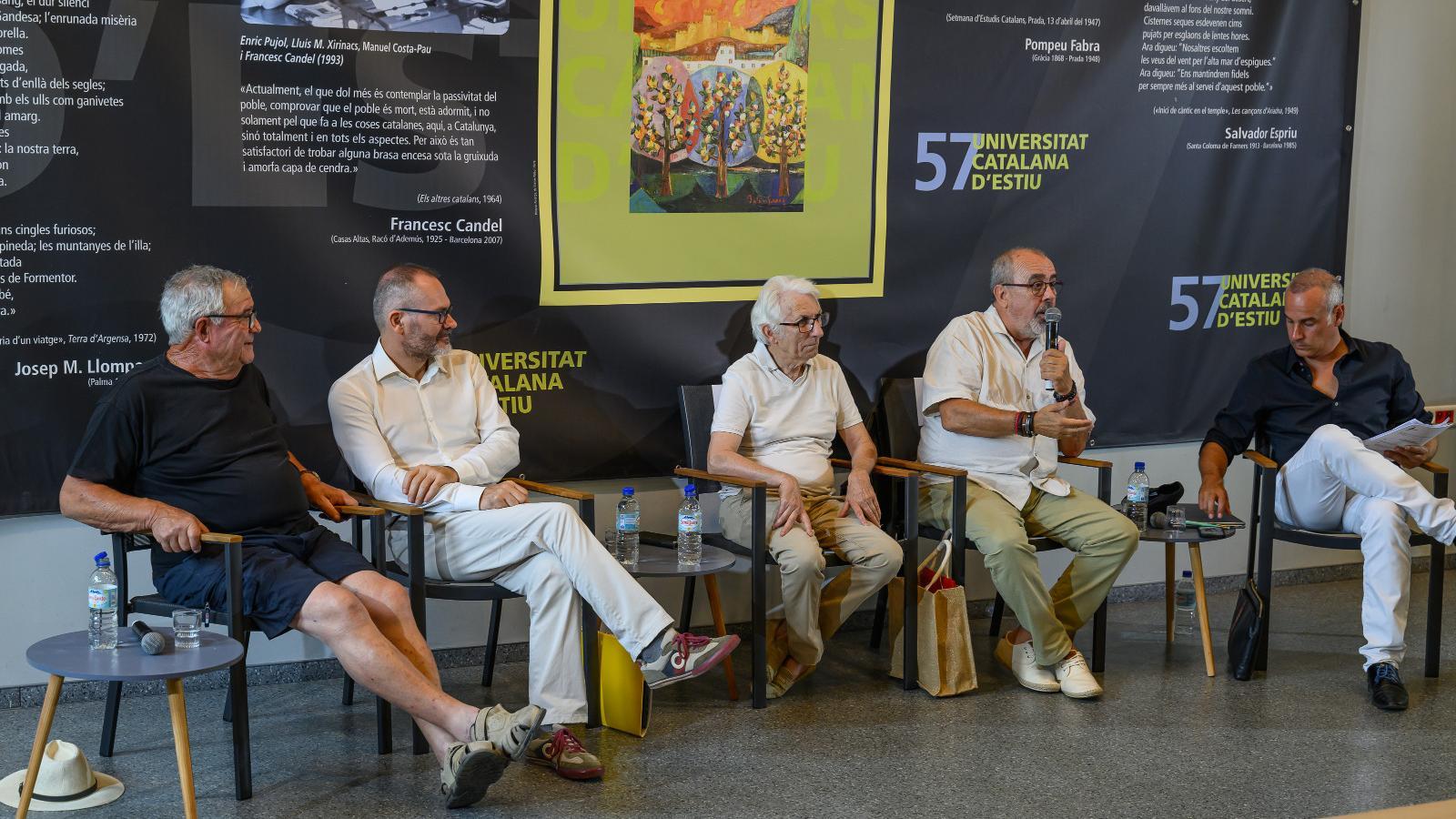"They took me to the police for a grant from Òmnium": this is what it's like to defend the language in Northern Catalonia.
Representatives from Roussillon and Conflent denounce the French state's "persecution" of Catalan through the UCE.


Conflent Meadow"Here, we're holding on as best we can." This is what Maria, a resident of Prada, says. She has been attending the Catalan Summer University (UCE) for years and sadly describes how Catalan is being lost in everyday life in Northern Catalonia, in businesses and homes. She turns to a couple of journalists in the UCE auditorium: she's curious to know which part of the Principality the accent she's heard them speak with corresponds to. Before the talk begins, she takes the opportunity to point out that, when she goes down to the Principality, she never switches languages: "When I go to Girona, I always speak Catalan. If they speak to me in Spanish, I leave. Catalan must be defended," she claims. But it's difficult to do so when, across the border, the French state tries by every means to keep it out of the institutions.
This is the message conveyed, a few minutes later, by the mayors of Northern Catalonia and representatives of the local world who participated in the event. Catalan in the municipalities. Persecution by the French state, this Tuesday. The common thread is the journey experienced by the five municipalities that have attempted to promote a change in their regulations so that councilors who wished to could speak in Catalan in plenary sessions. These were Terrats, Elna, the Baths of Arles, Portvendres, and Sant Andreu de Sureda, four years ago. None of their mayors could have anticipated, then, the tortuous path that awaited them in defending the language, which would end with them facing court.
The initiative of the five municipalities infuriated the prefect of the Pyrénées-Orientales. It wasn't enough for him to be assured by the councilors that the legal change guaranteed the translation of speeches into French (unlike what happened in Corsica, where a similar initiative was promoted for Corsican that did not guarantee translation into that language). "The way institutions work in France, you can't get angry with the prefect," recalls the mayor of Elna, Nicolau Garcia, because the risk is losing support for the municipality. "That pressure exists, and many mayors give in," he laments. Among other arguments, the prefect even argued that, according to a 500-year-old edict, Catalan could not be spoken in plenary sessions. A text that, incidentally, was approved when these municipalities were not yet part of France.
The court ruled in favor of the French government and overturned the reforms that allowed Catalan to be spoken in plenary sessions. The final argument, and the one adopted by the Toulouse Court of Appeal, was that, according to the French Constitution, French is the only official language of the Republic. "We can't go and say that they're denying us a linguistic right, because that doesn't exist in France. The only option left to us is to defend it as an act of freedom of expression," explains Perpignan lawyer Mateu Pons. This jurist took charge of the defense with Òmnium and Sioccat, a French public organization dedicated to promoting the Catalan and Occitan languages in Northern Catalonia.
Pons's story highlights the difficulty of fighting against politicians and judges educated "in the French Jacobin system," where any manifestation of an identity other than the hegemonic one is seen as a threat. Lawyer and former Junts MP Josep Costa has provided yet another piece of information: although the French state has signed the International Covenant on Civil and Political Rights, which in Article 27 enshrines the right of minorities to use their language, it has found a way to evade the obligations this would entail with respect to Catalans. This is because there are no minorities in the French state. The basis of homogeneity is to deny that they exist," he adds.
Denounced by the far right
The judicial persecution of these mayors is an example of the French state's offensive against the language in Northern Catalonia, but it is not the only one. The mayor of Elna recalls how, four years ago, the granting of a subsidy to Òmnium Cultural resulted in him receiving a summons at a police station: "They took me to the police for a 400-euro subsidy. Nothing happened, but they took me," he recounts. All of this followed a complaint from far-right councilors who argued that the deputy mayor, Pere Manzanares—president of Siocatt—should have abstained from participating in the decision because he was a member of the organization's board of directors. "Perhaps he didn't even remember that he was a member," the mayor emphasizes. At his side, Manzanares laments the "schizophrenic" attitude of the French state toward Catalan: while, on the one hand, it tries to stop plenary sessions in Catalan, on the other, it signs agreements with the Public Office of the Catalan Language to ensure that, within ten years, every student who wants to learn the language in the region will be able to do so. "If this isn't schizophrenia..." echoes the mayor of Elna.
However, there is hope for the Catalans of Roussillon, Conflent, Capcir, Cerdanya, and Vallespir—and for Fenolleda, where Occitan is spoken. The mayor of Tarerac, a small municipality in Conflent, has spoken. The mayor, Josep Lluís Salies, decided to join the initiative to fill town halls in Catalan, the local language. "There are 60 of us. We're not going to conquer Paris," he quips, referring to the French state's possible response to this challenge. For him, speaking the language is "like Canigou": "It's part of our essence." When he suggested to the residents that they begin using it in municipal life, the entire town followed his lead.
